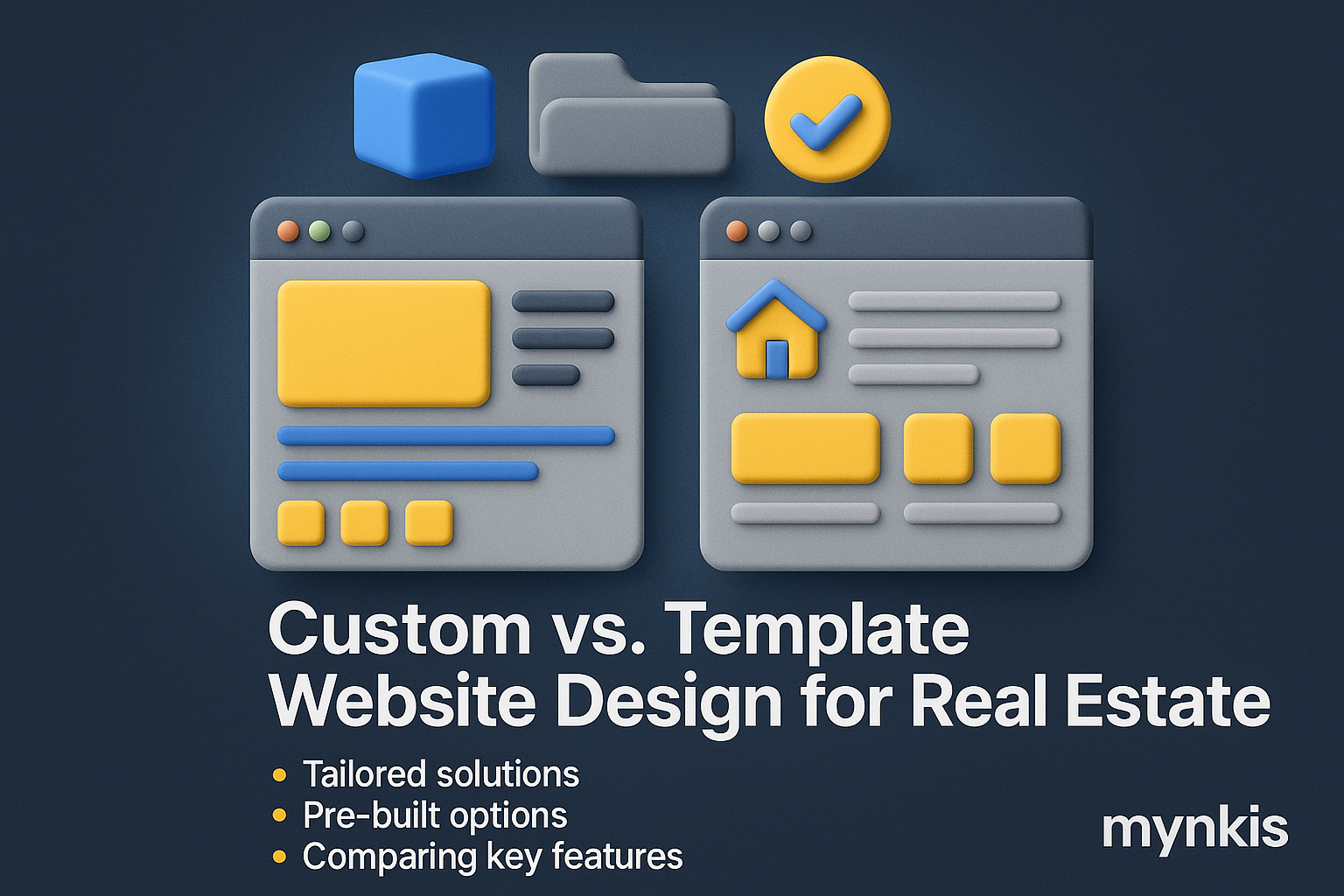Schedule a Demo
The real estate market thrives on visibility, which is often determined by the digital front doors—websites—where potential clients first engage with brokers and their listings. The critical question you, as a real estate broker, might be asking is whether to go for a custom-designed website or settle with a readily available template. Each option comes with distinct advantages and limitations, shaped significantly by factors like SEO functionality and the capacity to cater to local queries.
When it comes to custom website design, think of it as tailor-made clothing. It's crafted to fit your style, resonate with your brand, and fulfill specific user needs. For real estate professionals, a custom website can be optimized for local SEO with bespoke design elements that highlight the region’s unique aspects. The strategic placement of keywords targeting neighborhoods, detailed community descriptions, and integrated features like IDX (Internet Data Exchange) can enhance your site's search rankings for local queries.
I've worked with a range of professionals in high-visibility fields, akin to real estate, and the common lesson is flexibility. With custom design, I've witnessed clients able to adjust their digital strategy to reflect market shifts—a significant advantage where having an edge on location-specific searches can make a world of difference. Additionally, experts at organizations like HubSpot emphasize custom design as a pivotal factor for driving nuanced user experiences that keep visitors engaged and, ultimately, convert them into clients.
Choosing a template for your website might sound less enticing at first glance, but it's not to be underestimated. Built on robust platforms, these templates offer a quick start, often pre-equipped with SEO features. Provided templates may include SEO guides or integrate plugins like Yoast SEO, enabling you to boost rankings without extra effort. From personal experience assisting tech startups, I've seen how using a reliable template can help brand new entities establish an online presence with relative ease—saving time and resources while still achieving good SEO.
User experience (UX) forms the backbone of digital interactions. Here's where a custom design can make all the difference. A bespoke website allows you to ensure that every click, swipe, and mouseover serves a purpose tailored to your typical user's journey through your site. Concepts like intuitive navigation for searching property listings or seamless forms for inquiries can only be fully realized with custom coding. Studies from the Interaction Design Foundation highlight that UX customization directly impacts a user's likelihood to stay on your site and engage—crucially important when it comes to converting web traffic into property leads.
From an SEO perspective, templates can be your allies or your Achilles' heel. While many come with built-in SEO tools, the degree of customization they allow can be restrictive. Limitations might crop up in controlling meta tags, URL structures, or local search signals—elements pivotal for real estate SEO, where locale matters above all else. In my consulting work, I've walked companies through the optimization process, revealing templates' genuine flexibility can set the floor, but innovative SEO requires customization.
Consider also the lifecycle of your digital presence. A website isn’t a one-and-done setup; it's a dynamic entity meant to evolve with your business and industry trends. When researching at places like the Digital.gov, one key takeaway was clear: While templates give swift initial setups, custom solutions ensure longevity and alignment with cutting-edge techniques in custom software development. Additionally, a custom website makes it feasibly less resource-consuming to upgrade and align with the ever-changing nature of technology, safeguarding your digital investment over time.
Immediate cost often influences decision-making. Templates appeal due to their lower upfront price compared to a custom design. But as Alan Moore noted at Search Engine Land, consider the holistic cost over time. Can your template grow without costly workarounds or total rebuilds as SEO best practices and your real estate offerings change? From first-hand observations, while customers are enticed by initial savings, reworking a budget-limited site proves more painful in the long term than frontloading the financial resource into custom architecture that outpaces the need to change.
Security issues need attention when crafting your website’s scheme. A custom design allows not only flexibility but control of your digital-security destiny—including updates that meet rigorous cybersecurity standards. Templates, particularly those that charge little up front or require licensing agreements, can sometimes entangle you within structured support systems you cannot alter freely. When selecting client projects, facilitating protected freedom over each platform's base has never been about less—I've secured levels upheld confidently by adaptive design provided directly by craftsmanship absent bulk dependencies.
The debate is nuanced, best deliberated upon with an understanding of how you envision your real estate firm’s online presence. Are you leaning towards a unique marketing approach, requiring tailor-fitted SEO strategies—though meeting a costlier entrance price—or could launching off expansive functionality tuned adequately around your local market suffice while you gauge long-term investment asks? I meditate upon both avenues based on applicable takeaways stem research-converted-seode experience countless transforming possibilities tailored by specific client individual shape delivery precisely set-enable-real.
